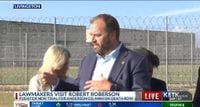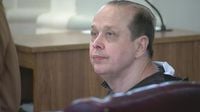With just days remaining before his scheduled execution, Robert Roberson’s case has become a lightning rod for debate about the death penalty, scientific integrity in the courtroom, and the fallibility of the American justice system. Roberson, a 58-year-old Texan, is set to be executed on October 16, 2025, nearly a year after a dramatic last-minute reprieve. His conviction for the 2002 death of his two-year-old daughter, Nikki Curtis, was based on the now-discredited diagnosis of shaken baby syndrome—a theory that has since been widely challenged and, in many instances, debunked by the scientific community.
The story begins in the small east Texas city of Palestine, where Roberson’s life took a tragic turn over two decades ago. In 2003, he was convicted of murdering Nikki after prosecutors alleged he had violently shaken and fatally injured her. According to The Associated Press, Roberson has always maintained his innocence, insisting, “I never shook her or hit her.” He claims Nikki died from complications related to pneumonia, not from abuse. “It was bad enough losing my little girl. And then when they accused me of it, I couldn’t believe it,” Roberson told the AP in a recent interview from the Polunsky Unit in Livingston, Texas, where he remains on death row.
Roberson’s case has drawn national and international attention, not just because of the uncertainty surrounding Nikki’s cause of death, but also due to revelations about the conduct of those involved in his trial. A recent Dateline NBC podcast brought to light new evidence that Judge Bascom Bentley, who presided over Roberson’s original trial, had previously authorized Nikki’s removal from life support—a decision that, under Texas law, should have been Roberson’s alone. In an interview aired by FOX 4, Nikki’s maternal grandfather, Larry Bowman, recounted, “A judge in Palestine called the hospital, informing staff that Robert was no longer allowed to make decisions about Nikki.” When asked if he had to make the decision to take Nikki off support, Bowman replied, “Yeah, we did.”
This revelation has prompted Roberson’s defense attorney, Gretchen Sween, to file multiple appeals, arguing that the judge’s involvement constitutes a fundamental conflict of interest and a violation of Roberson’s right to a fair trial. “This is just more fundamental. It’s like a judge should not be involved in circumventing the law to end a life, to arrest him and be involved in the facts and then preside over a trial. It’s not right,” Sween stated to FOX 4. She contends that this new evidence, combined with the debunked shaken baby syndrome diagnosis, should be more than enough to warrant a new trial.
Roberson’s defense has also cited his autism diagnosis—made in 2018, long after his conviction—as a critical factor in how he was perceived by investigators and jurors. Medical providers and investigators at the time viewed Roberson’s flat affect as corroborating his guilt, according to The Texas Tribune. “They assumed (guilt) because of the way I was acting, you know. And I didn’t know I was autistic, you know, until years and years later, you know,” Roberson explained to the AP. His legal team argues that his undiagnosed autism contributed to misinterpretations of his behavior, further undermining the fairness of his trial.
The scientific foundation of Roberson’s conviction has crumbled in recent years. Shaken baby syndrome, once considered a clear indicator of child abuse, has come under intense scrutiny. As Slate notes, “Since his conviction, shaken baby syndrome has been discredited in the scientific community.” Texas has even passed a law allowing courts to review criminal convictions based on changes in scientific evidence. Roberson’s lawyers have presented expert testimony suggesting Nikki likely died from undiagnosed pneumonia, which caused sepsis and brain bleeding—an alternative explanation that challenges the original prosecution’s narrative.
Despite mounting evidence and public outcry, the state of Texas has remained resolute in its pursuit of Roberson’s execution. Texas Attorney General Ken Paxton’s office maintains that Nikki died from child abuse, not natural causes, and that Roberson had a history of hitting his daughter. In a press release following Roberson’s previous stay of execution, Paxton’s office insisted, “This was no mere shaken baby case but involved a child who was beaten and received multiple blows to the head.” Yet, one of the jurors from Roberson’s trial, Terre Compton, told lawmakers last year, “Everything that was presented to us was all about shaken baby syndrome. That is what our decision was based on.”
The divide over Roberson’s guilt or innocence is not limited to the courtroom. The case has galvanized a diverse coalition of supporters, including liberal and conservative lawmakers, the Center for Integrity in Forensic Sciences, the Autism Society of America, bestselling author John Grisham, and even Brian Wharton, the former detective who helped build the case against Roberson. At a recent rally outside the Texas Capitol, Wharton declared, “The whole world is watching. Texas, do not kill this innocent man.” Texas Rep. Rhetta Bowers, who was part of the bipartisan group that secured Roberson’s last-minute reprieve in 2024, emphasized, “I think that everyone witnessed that last year that we were fighting until the very end, until we could get that stay of execution for Robert Roberson. And I know that my colleagues and I, as we come together to urgently ask for his execution to be halted, we’re fighting in that with that same passion.”
Roberson himself remains calm, placing his fate in the hands of his lawyers, supporters, and faith. “I’m not going to stress out and stuff because I know God has it, you know. He’s in control. No matter what, God’s in control, you know, and he does have the last say, you know,” he told the AP. Still, he holds out hope for another stay of execution and, ultimately, a new trial that could clear his name.
As the clock ticks toward October 16, Roberson’s defense team continues to file appeals, and lawmakers prepare to visit him in a final push for clemency. The case remains pending in the court of criminal appeals, but the state is pressing forward to set the execution date. The outcome will not only determine Roberson’s fate but will also stand as a test of the justice system’s capacity for self-correction in the face of new evidence and shifting scientific consensus.
Whatever happens next, the Roberson case has forced Americans to confront uncomfortable questions about the reliability of capital punishment, the role of science in the courtroom, and the human consequences of judicial error. For Roberson, the hope for justice endures, even as time runs short.


